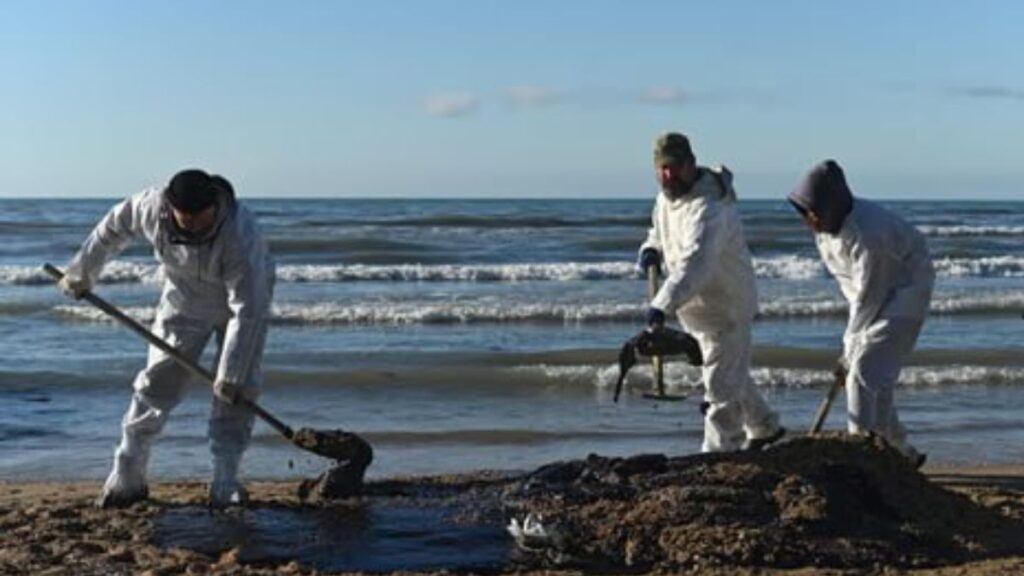Relevance: UPSC Prelims – Current Affairs, Environment | UPSC Mains – General Studies II & III
On January 6, 2025, Russian officials in Crimea declared a regional emergency after a significant oil spill affected Sevastopol, Crimea’s largest city. The spill, originating from two storm-damaged tankers in the Kerch Strait, has prompted widespread concern over its environmental and geopolitical consequences. This article explores the causes, impacts, and response measures to the oil spill, with a focus on the implications for marine ecosystems and global trade, while also considering the role of international conventions in managing such disasters.
Oil Spill in Crimea: A Growing Crisis
The Kerch Strait, which separates Crimea from Russia’s Krasnodar region, has been the epicenter of a disastrous oil spill. Nearly three weeks ago, two tankers were struck by severe storms, causing a fuel oil leak that has since affected the coastal waters of Sevastopol. As of January 6, 2025, the spill has washed up on beaches, with four locations along the coast affected, prompting local authorities to declare a regional emergency.
The spill’s impact has been severe, affecting not only the marine ecosystem but also local economies dependent on fishing and tourism. The Russian government’s quick response has included deploying cleanup teams to remove the oil from beaches, but the situation remains critical. The local population and international observers are concerned about the long-term environmental damage.
Geopolitical Context: The Importance of the Kerch Strait
The Kerch Strait plays a crucial role in geopolitics and global trade. It serves as a vital connection between the Black Sea and the Sea of Azov, enabling the movement of goods between Russia and Ukraine. In 2014, following Russia’s annexation of Crimea, the Kerch Strait became a strategic military and economic asset for Russia. The ongoing environmental disaster in the region, coupled with political tensions, has further complicated the situation.
The oil spill has implications not only for the local population but also for international trade and shipping routes. The strait’s importance as a key waterway for Russia and the global shipping industry highlights the intersection of environmental and geopolitical concerns.
Environmental Impacts of Oil Spills
Oil spills pose severe risks to marine ecosystems. The most immediate threat is the suffocation of marine life as the oil forms a surface layer, blocking sunlight and disrupting oxygen exchange in the water. This can lead to the death of fish and other aquatic species. Moreover, the spilled oil harms coastal vegetation, which serves as an essential habitat for many marine organisms.
Marine birds and mammals, such as sea otters, are particularly vulnerable to oil exposure. The oil destroys the insulating properties of their fur or feathers, leading to hypothermia and death. The spill in Crimea is no exception, and authorities are working to mitigate these effects on local wildlife.
Oil Spill Cleanup and Response Measures
Addressing oil spills requires a multifaceted approach, which includes both immediate containment measures and longer-term recovery actions. The primary methods for cleaning up oil spills are:
- Skimming: Removing the oil from the sea surface before it reaches the coastline.
- In Situ Burning: Controlled burning of oil patches that have concentrated in a specific area.
- Chemical Dispersants: These chemicals break down the oil into smaller droplets, making it easier for microbes to degrade and neutralize the harmful substances.
- Bioremediation: Natural processes like biodegradation and oxidation, which involve the breakdown of oil by microorganisms in the environment, also play a significant role in reducing the spill’s impact.
In addition to these techniques, local authorities in Sevastopol and Krasnodar are utilizing containment barriers, deploying cleaning agents, and monitoring affected areas to ensure prompt and effective recovery.
International Conventions and Oil Spill Management
The management of oil spills is governed by several international conventions aimed at minimizing environmental damage and ensuring timely and effective responses. The International Convention on Oil Pollution Preparedness, Response, and Cooperation (OPRC) sets the global standard for oil spill management. It emphasizes the importance of preparedness, cooperation between nations, and the timely response to mitigate damage.
Furthermore, the International Convention on Civil Liability for Oil Pollution Damage (CLC) holds responsible parties accountable for the cleanup and compensation, ensuring that countries or corporations that cause oil spills bear the financial burden of recovery efforts.
These conventions are essential for coordinating international responses to large-scale environmental disasters and ensuring that affected regions receive the necessary resources to address the crisis.
Key Takeaways and Implications for UPSC CSE
The oil spill in Crimea highlights several important themes for the UPSC examination:
- Geopolitical and Economic Significance: The Kerch Strait’s role in regional and global trade underlines the importance of understanding the geopolitical context of environmental issues.
- Environmental Impact: The severe damage caused to marine ecosystems by oil spills emphasizes the need for comprehensive environmental protection policies.
- Disaster Management: The response to the oil spill illustrates the importance of emergency preparedness and coordinated action in addressing environmental disasters.
- International Cooperation: International conventions such as the OPRC and CLC provide a framework for cooperation and accountability in managing oil spills, stressing the need for global governance in addressing environmental challenges.
For the Prelims, candidates should focus on understanding the environmental, political, and economic dimensions of the crisis, while for the Mains, an in-depth analysis of the environmental impact, policy responses, and international cooperation frameworks would be crucial.
Conclusion
The oil spill in Crimea serves as a reminder of the complex relationship between environmental disasters, geopolitical tensions, and the global community’s responsibility for managing such crises. It underscores the need for robust disaster management frameworks, international cooperation, and a proactive approach to environmental conservation to mitigate the effects of future incidents. Understanding these dimensions is essential for UPSC aspirants preparing for both the Prelims and Mains examinations.
Also Read: Joe Biden Awards Presidential Medal of Freedom to Hillary Clinton, George Soros and Lionel Messi
Disclaimer: The information provided is for educational purposes and general awareness, particularly for UPSC aspirants.
Follow Fusion IAS

